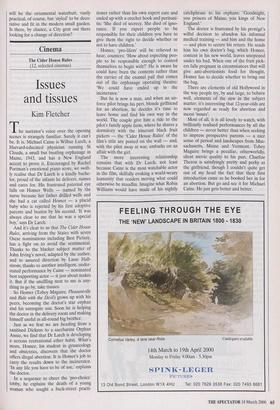Gardens
Changing habits
Ursula Buchan
Isuppose I shall always be one of life's urchins, pressing my nose up against the sweet-shop window. I know the value, superiority and appeal of pineapple chunks over Dolly Mixtures but cannot cash in on my knowledge. Some years ago it occurred to me, as I suppose it must have occurred to many others, that there would be a sub- stantial change in gardening habits and preoccupations in this country, as people adjusted to greater demands at work and increased pressures to 'enjoy' their leisure time. Thirty years ago, people were more philosophical about gardening; it might be damned hard work but that very work brought its own rewards. Who thinks like that now?
A direct result of changing attitudes has been the exponential rise in the popularity amongst amateur gardeners of 'young plants', often called, generically, 'plugs', for potting up, growing on and then planting out in spring. This is in preference to the cheaper but more time-consuming business of sowing seed. The enormous increase in interest in what are loosely, and inelegant- ly, called 'containers', particularly amongst people who had not heretofore shown a lot of interest in gardening, has hiked demand for easy-to-grow tender plants which you could either look after on a windowsill for a few weeks or put straight into tubs or hanging baskets, and put outside when the danger of frost was past.
Such changes offered opportunities for anyone prepared to grasp them. Yet, did I do anything constructive about it? What do you think? Both entrepreneurial spirit and financial muscle are so lacking in me, that I could never seriously consider buying into a nursery operation changing from, say, increasingly unprofitable tomato produc- tion to the rearing of `plugs'.
Others, often not from traditional horti- `Who taught her to beg?' cultural backgrounds, have seen the gap, and headed for it. In 1990, R. Delamore Ltd was a flagging chrysanthemum nursery on good, light fen soil near Wisbech, when it was bought by Peter Wood, a youngish chap looking to get out of commodity broking, and his wife, Ann, a journalist. Delamore's is not a household name, nor ever likely to be, for it is a nursery which raises cuttings to sell mainly to commercial growers, and has no direct dealings with the public. Yet it produces 1.5 million 'plugs' a week between January and August, most of which go to other commercial growers to grow on, but 25 per cent of which are offered to gardeners through horticultural mail-order catalogues, garden centres and, increasingly, the Internet. You may well have ordered fuchsias from a catalogue to arrive in spring, which, without your know- ing it, originated from Delamore's.
Nursery processes are highly automated and computer-controlled these days, so much so that at Delamore's plants are not moved around as they develop and require different temperature, light, humidity and watering regimes, for that is too labour- and time-consuming; instead, computers change the atmosphere in the greenhouse, or even in certain bays of the same green- ' house. Traditionalists will note with satis- faction that humans have not been replaced entirely, however. Delamore's employs 110 people in the peak season, mostly hard-working fenland women, known as 'the girls', on piece work. You can do most things by machine, but not `sticking' cuttings. To cope with the highs and lows of seasonal demand, Delamore's grows plugs of bedding plants in spring, then chrysanthemums, then shrubs. That way, though the business is at fullest stretch in the first few months of the year, it never flags entirely. The venture has been a con- spicuous success, with the company having a turnover of £5 million last year. It was the main trade journal's 'Exporter of the Year' in 1999.
The gardening market is complex and hugely fragmented. Its total value is rising steadily (from £2.17 billion in 1991 to £2.8 billion in 1998, according to Mintel Mar- keting Intelligence) but, as certain sectors become more buoyant, some traditional areas struggle. As well as the rise in num- bers of 'young plants' bought for contain- ers, hardy perennials have also flourished but partly at the expense of shrubs, particu- larly bush roses and conifers. At the pre- sent time, the 'enhancement' sector has been helped by the popularity of garden `makeover' programmes, together with estate agents' claims of added value, but tools and equipment have remained pretty static. There is certainly space for the canny entrepreneur to flourish, provided he has assessed his market, and watched the trends. For myself, I believe that, as a result of projected climate changes with winters wetter and summers drier, the next big thing to boost the equipment market will be the ornamental waterbutt, vastly practical, of course, but 'styled' to be deco- rative and fit in the modern small garden. Is there, by chance, a City gent out there looking for a change of direction?



















































































 Previous page
Previous page